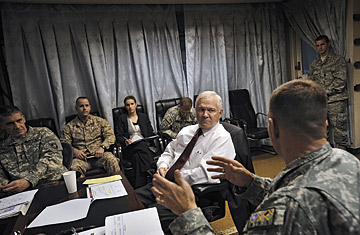
Gates being briefed at Camp Eggers in Kabul during a tour of Afghanistan last December.
(5 of 12)
Lately Gates has been pressing Pakistani generals to go after the jihadis they helped create--men like Jalaluddin Haqqani, whose son now wields the deadliest force in North Waziristan, from which he launches attacks against U.S. troops in Afghanistan. To Afghan and Pakistani audiences, Gates likes to reiterate that the U.S. made a big mistake when it abandoned the region after the Soviets withdrew in 1989. This time is different, he says. But the Pakistanis are not convinced. They still count the Taliban as a bulwark against Indian influence in Afghanistan and an ally in the civil war that is sure to follow after the U.S. leaves.
After his most recent trip to Islamabad, I asked Gates how he could consider Pakistani officials who support Haqqani's network as allies. "It's frustrating," he said, then went quiet. I suggested that his silence said a lot.
"Well, I was very specific in a couple of my meetings in looking at them point blank and saying, 'Haqqani and his people are killing my troops. I've got a problem with that.'"
And the response? "They listened."
'Black Chinook'
Gates is prone to bracingly honest language that is not necessarily reassuring from a man who has the weight of Obama's Afghanistan policy on his shoulders. But that may be because Gates has something of the writer's sensibility about him. He has the look of a man both in the moment and at a slight angle, peering in, through dark glasses, upon the human comedy. In his 1996 memoir, From the Shadows, he wrote, "I was, during the remarkable events from the late 1960s to the early 1990s, there in the shadows, the proverbial fly on the wall in the most secret councils of government, listening, watching, observing many of the greatest events of the century."
Gates' career has not been without controversy. He made his name as a Cold War hawk, an intelligence analyst who saw the Soviet Union as an implacable and evil adversary. During the Reagan Administration, he sided with hard-liners who got the Soviets wrong. He failed to recognize that Mikhail Gorbachev was a true reformer. He didn't believe that Soviet power was collapsing. "He said the Soviets would never leave Afghanistan. They did. He said [former Afghan President] Najibullah would never survive the Soviet departure. He was totally wrong. Najibullah survived three or four years," recalls Mort Abramowitz, who was Assistant Secretary of State for Intelligence and Research at the time. "People make mistakes. Bob is not infallible."
Gates' ambition and intensity didn't always endear him to his colleagues, who say he has mellowed with age. "He was on the make when I knew him. He's made it now," says one. In 1987, after then CIA director William Casey retired, Reagan nominated Gates to become director of central intelligence. It was the midst of the Iran-contra hearings, however, and there was little hope of a quick confirmation. After four weeks, Gates withdrew his nomination. He recalls going back to his job as deputy and wanting to hide from his colleagues, then getting a call that his father died. Gates was convinced that watching him go through those hearings and investigations was too much for his father's weak heart. The shock and the stress of those six months was too much for Gates as well. He shut the door to his office and wept.
